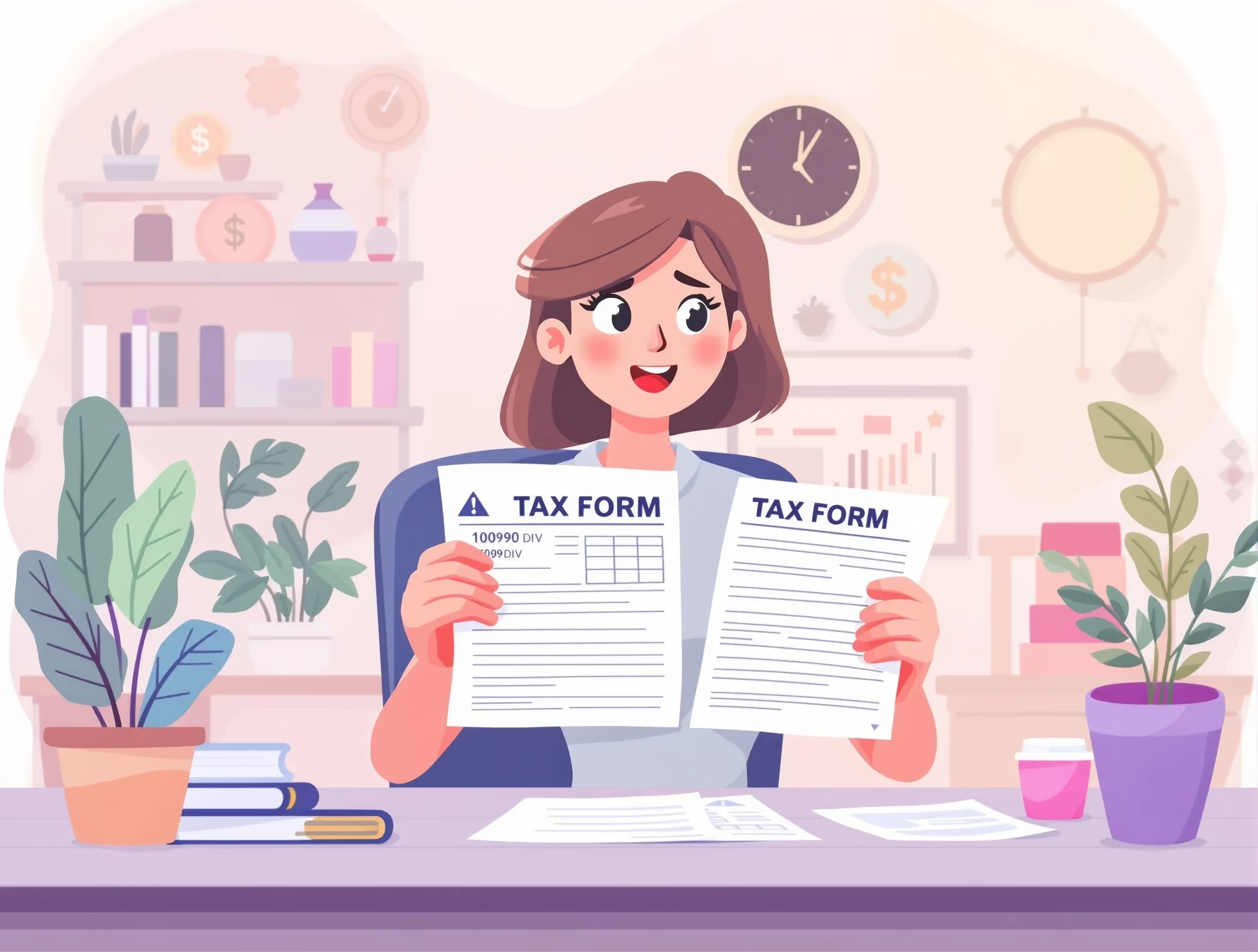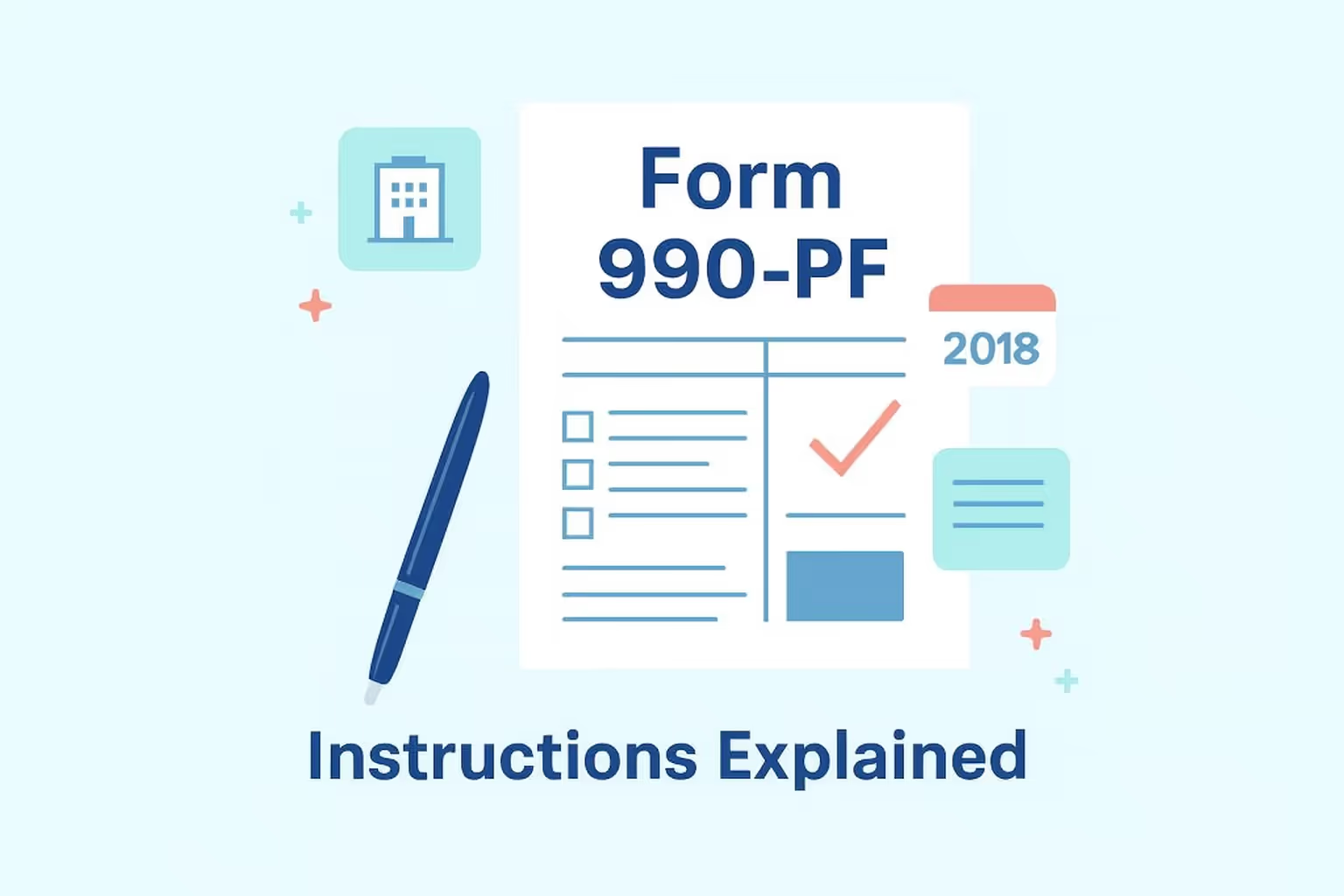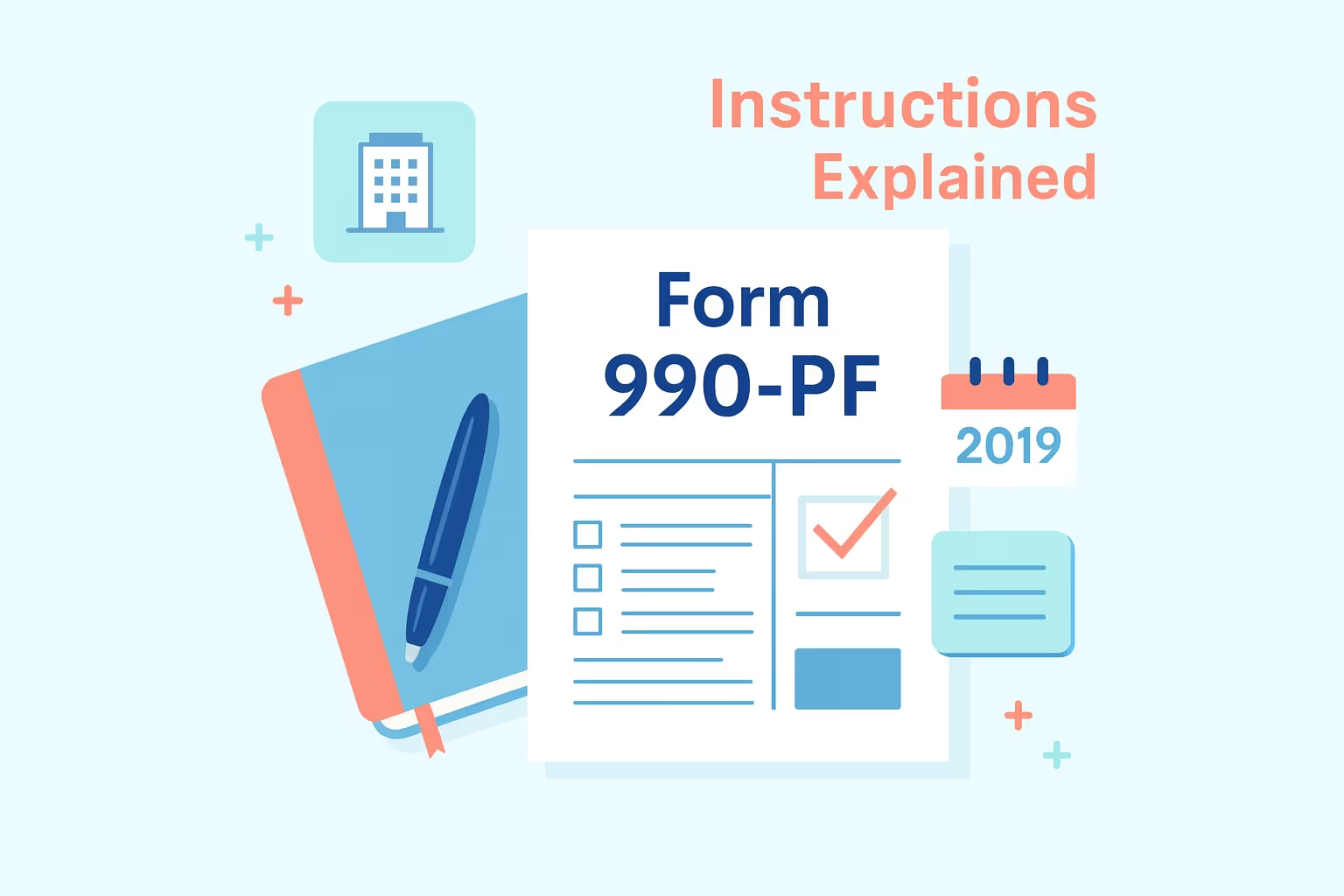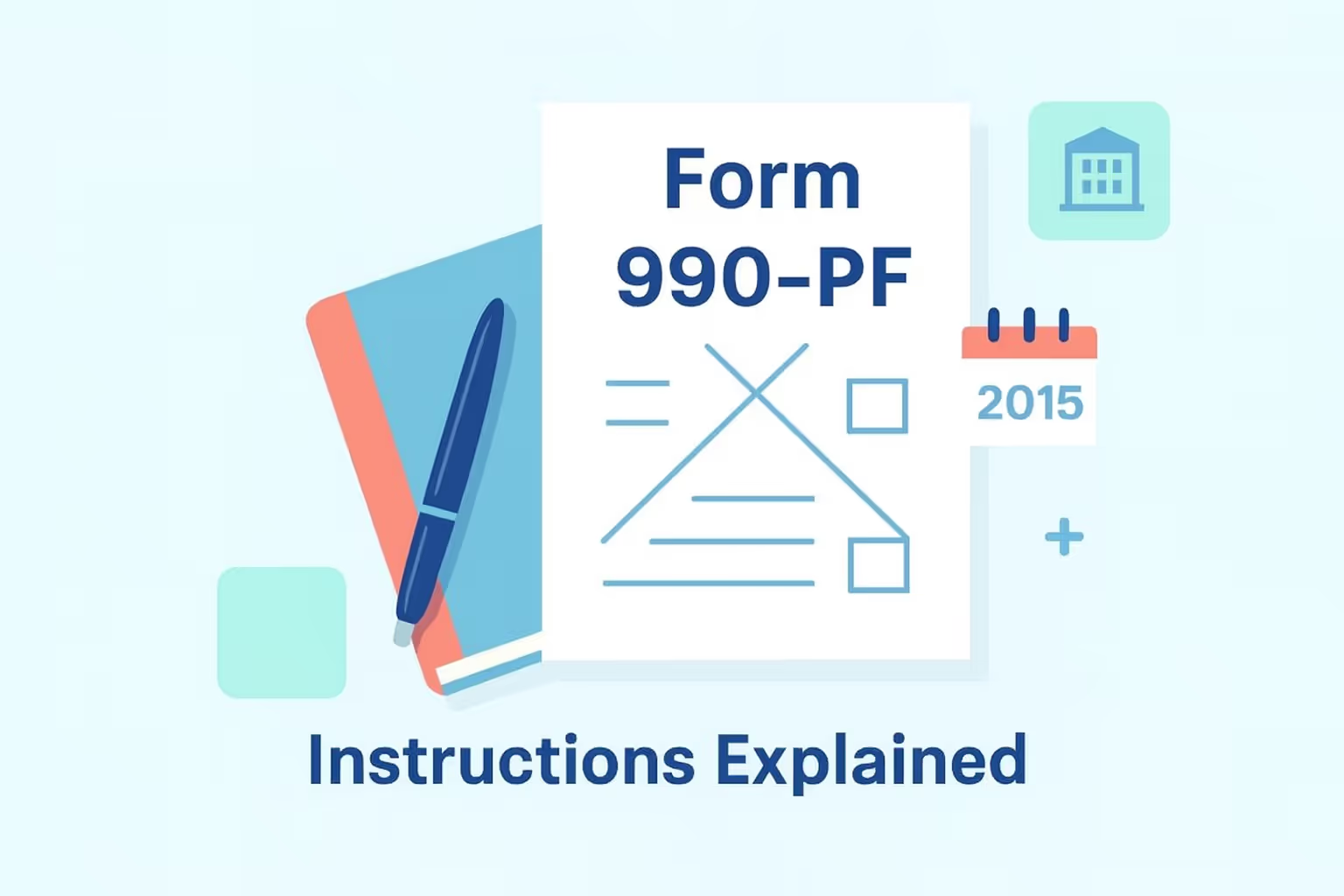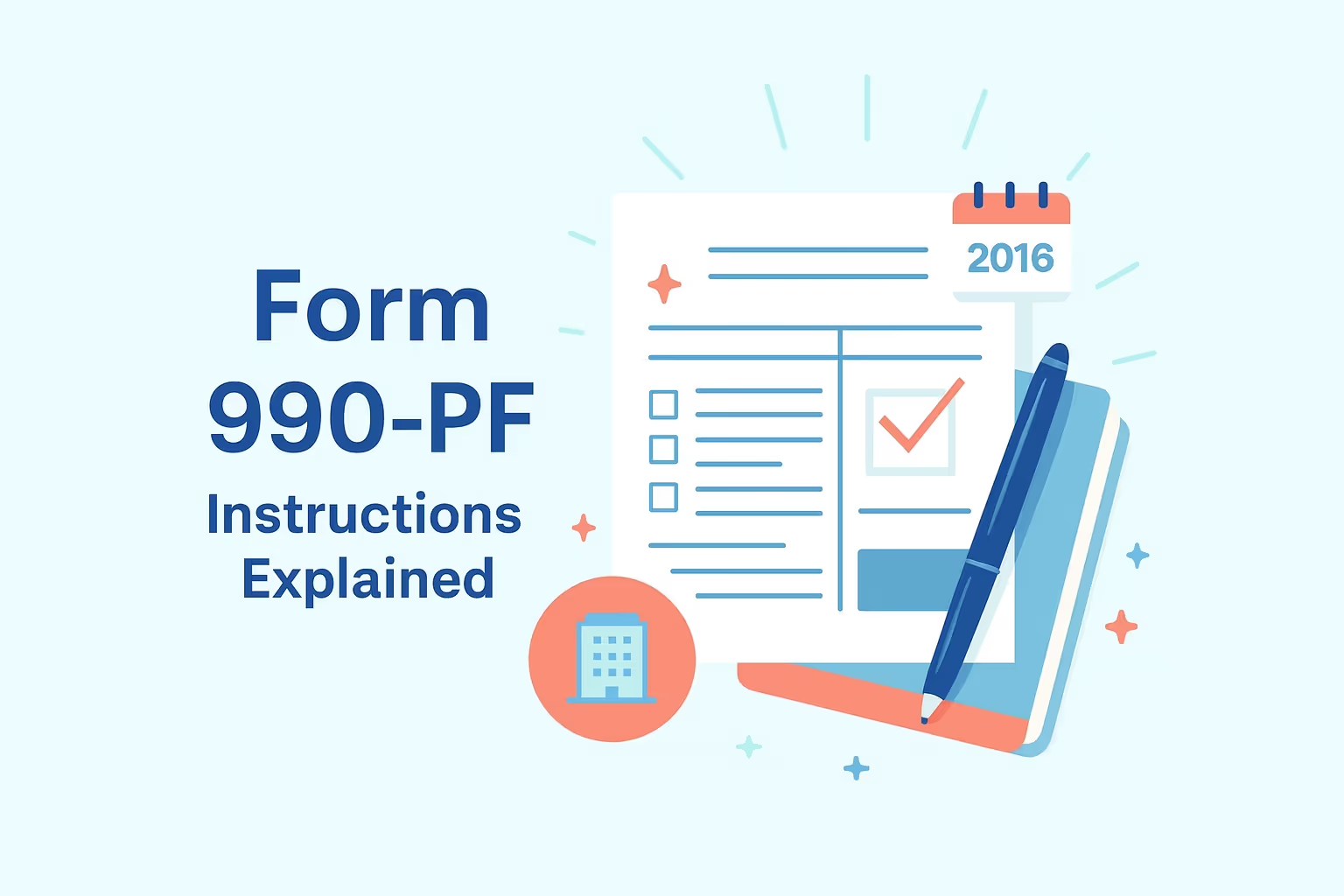
What IRS Form 990-PF (2025) Is For
Form 990-PF is the annual information return private foundations file with the Internal Revenue Service to report net investment income, investment income sources, qualifying distributions, and net assets for the tax year. It applies to exempt private foundations, taxable private foundations, and any non-exempt charitable trusts treated as private foundations. The form documents charitable purposes, administrative expenses, program-related investments, and activities that determine excise tax-based obligations, minimum investment return requirements, and overall compliance with tax-exempt status.
When You’d Use IRS Form 990-PF (2025)
You must file Form 990-PF for each tax year beginning in 2025 when operating as a private foundation, regardless of gross receipts or adjusted gross income. Filing is required even when income taxes are not owed. Late or amended return filings apply when information changes, qualifying distributions were misreported, or excise tax calculations need correction. Amending the annual information return helps avoid penalties and supports retroactive recognition of exempt status when applicable.
Key Rules or Details for 2025
- Excise tax rate: Foundations pay a 1.39 percent excise tax based on net investment income, which includes dividends, capital gains, mutual funds, and tax-exempt interest, all considered net investment income.
- Minimum investment return: Foundations calculate minimum investment return using average asset values, and meeting this obligation ensures qualifying distributions satisfy federal requirements for charitable purposes.
- Public inspection standards: Public inspection requirements apply to the annual information return filed, and foundations must provide documents without revealing Social Security benefits information or other sensitive data.
- Electronic filing: The IRS requires e-file submission for all private foundations. Electronic filing improves accuracy while helping filers avoid penalties caused by rejected paper returns.
- Payout compliance: Undistributed income generates additional taxes when minimum distributions fall short, and tracking qualifying distributions prevents further penalties during the taxable year.
Browse more tax form instructions and filing guides in our Forms Hub.
Step-by-Step (High Level)
Step 1: Gather key financial and operational records
Collect information on investments, fund balances, rental income, unemployment compensation, and other income sources. Include balance sheets, administrative expenses, financial instruments, and program-related investments. Comprehensive data ensures accurate reporting of assets, money spent, and activities supporting charitable purposes.
Step 2: Complete the correct-year version of Form 990-PF
Use the official 2025 form and review Part I and related schedules before entering figures. Confirm that adjusted gross income totals, gross income, and net assets information reflect the previous year and current taxable year. Accuracy helps the foundation maintain its exempt status and comply with Internal Revenue Service requirements.
Step 3: Calculate excise tax, qualifying distributions, and payout amounts
Enter net investment income, capital gains, dividends, and rental income to compute the excise tax-based obligations. Determine minimum investment return and identify qualifying distributions that apply toward payout requirements. These calculations impact tax liability, estimated tax requirements, and the existence of undistributed income.
Step 4: Report charitable distributions and key foundation activities
Document charitable distributions, program-related investments, and payments for philanthropic purposes. Include details for qualifying person recipients, foreign country grants, and administrative expenses. Accurate reporting supports public charity comparisons, verifies exempt status, and aligns with public inspection requirements.
Step 5: File electronically with the IRS
Submit the return using an approved e-file provider before the due date based on the beginning of the tax year. Electronic filing ensures timely processing, reduces errors, and facilitates the faster posting of the annual information return. Late filings can increase tax-based penalties and negatively impact compliance history.
Step 6: Keep copies for future review
Maintain copies of the return, fund balance worksheets, and calculations for a minimum of three years. Retaining full records enables foundation managers to respond effectively to Internal Revenue Service inquiries, prepare amended return filings, and demonstrate compliance with specific thresholds that affect private foundation status.
Learn more about federal tax filing through our IRS Form Help Center.
Common Mistakes and How to Avoid Them
- Incorrect reporting of net investment income: Foundations sometimes overlook items considered net investment income. Reviewing all investments ensures that tax liability and excise tax amounts remain accurate and compliant.
- Missing qualifying distributions: Foundations occasionally fail to track payments that count toward payout requirements. Maintaining organized grant files prevents undistributed income from accumulating during the taxable year.
- Using outdated financial information: Errors happen when previous year balances are used incorrectly, and reconciling balance sheets ensures accurate reporting of assets, income, and fund balances.
- Failing to e-file correctly: Submissions may be rejected when e-file steps are not completed properly, and confirming accepted status helps avoid penalties and late filing notices.
- Misreporting of administrative expenses: Expenses are sometimes categorized incorrectly. Reviewing foundation managers’ records ensures accurate totals that reflect operational needs and charitable purposes.
Learn more about how to avoid business tax problems in our guide on How to File and Avoid Penalties.
What Happens After You File
The IRS processes most electronically filed returns within several weeks, although reviews may take longer if the foundation reports complex investments or high fund balances. If taxes are owed, payment instructions apply based on tax liability for the taxable year. The IRS may request clarification if entries appear inconsistent, and responding promptly helps avoid penalties. Amended returns remain available when updates are required.
FAQs
How does IRS Form 990-PF 2025 affect private foundations reporting net assets?
Form 990-PF requires reporting detailed net asset information, including beginning balances, ending balances, and asset categories that affect minimum distributions.
How does Form 990-PF calculate estimated tax for private foundations?
Estimated tax applies when excise tax-based obligations exceed certain thresholds, and foundations must compute quarterly payments when required.
How does Form 990-PF handle undistributed income for private foundations?
Undistributed income results when qualifying distributions fall short, and Form 990-PF identifies amounts subject to additional taxes until corrected.
How does Form 990-PF report rental income for private foundations?
Rental income is included in gross income and may be considered net investment income, depending on the type of asset and tax-based treatment.
How are excise tax-based rules applied on Form 990-PF for private foundations?
Foundations calculate excise tax using net investment income totals, and accurate reporting prevents later assessments or amended return filings.
How does Form 990-PF reflect minimum investment return calculations?
The form requires average asset values to compute the minimum investment return, which determines whether a foundation meets payout requirements.
How do foundation managers report administrative expenses on Form 990-PF?
Administrative expenses appear in Part I and must reflect accurate operational costs supporting charitable purposes and exempt status.
For more resources on filing or understanding prior-year IRS forms, visit our guide on Nonprofit & Exempt Organization Forms.






